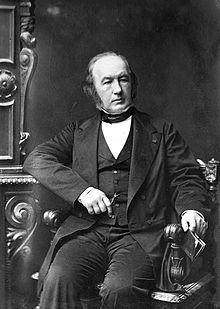Claude Bernard
Claude Bernard (12 July 1813 – 10 February 1878) was a French physiologist. He has been called "one of the greatest of all men of science".[1] He was one of the first to suggest blind experiments to get scientific observations more free of bias.[2] He was the first to define the term milieu interieur,[3] which is now known as homeostasis, a later term coined by Walter Cannon.

Bernard made animal experimentation a part of the standard scientific method.[4][5] He famously wrote in 1865 that "the science of life is a superb and dazzlingly lit hall which may be reached only by passing through a long and ghastly kitchen".
He was born in 1813 in Saint-Julien near Villefranche-sur-Saône. He wrote comedies and other plays. When he was 21 he went to Paris with his play and went to a critic. But the critic suggested for him to study medicine instead of literature.
In 1845 Bernard married Françoise Marie (Fanny) Martin for her money. Her money helped him in his experiments, but she was firmly against his methods, and founded the first French society for anti-vivisectionists. When he died Bernard was given a public funeral. This was something which had never been given by France to a man of science before.
References
change- ↑ See Cohen's Foreword to the Dover edition (1957) of Bernard's classic on scientific method, An Introduction to the Study of Experimental Medicine (originally published in 1865)
- ↑ Daston, Lorraine (2005). "Scientific error and the ethos of belief". Social Research. 72 (1): 18. doi:10.1353/sor.2005.0016. JSTOR 40972000. S2CID 141036212.
- ↑ Bernard C. 1974. Lectures on the phenomena common to animals and plants. Trans Hoff HE, Guillemin R, Guillemin L, Springfield (IL): Charles C Thomas. ISBN 978-0-398-02857-2
- ↑ Bernard, Claude 1865. An introduction to the study of Experimental Medicine. First English translation by Henry Copley Greene, published by Macmillan 1927; reprinted 1949, p125
- ↑ LaFollette H. & Shanks N. 1994. Animal experimentation: the legacy of Claude Bernard. International Studies in the Philosophy of Science pp195-210.
Other websites
change- "Works by Bernard, Claude in French". laphilosophie.fr. Archived from the original on 21 July 2011. Retrieved 1 July 2010.